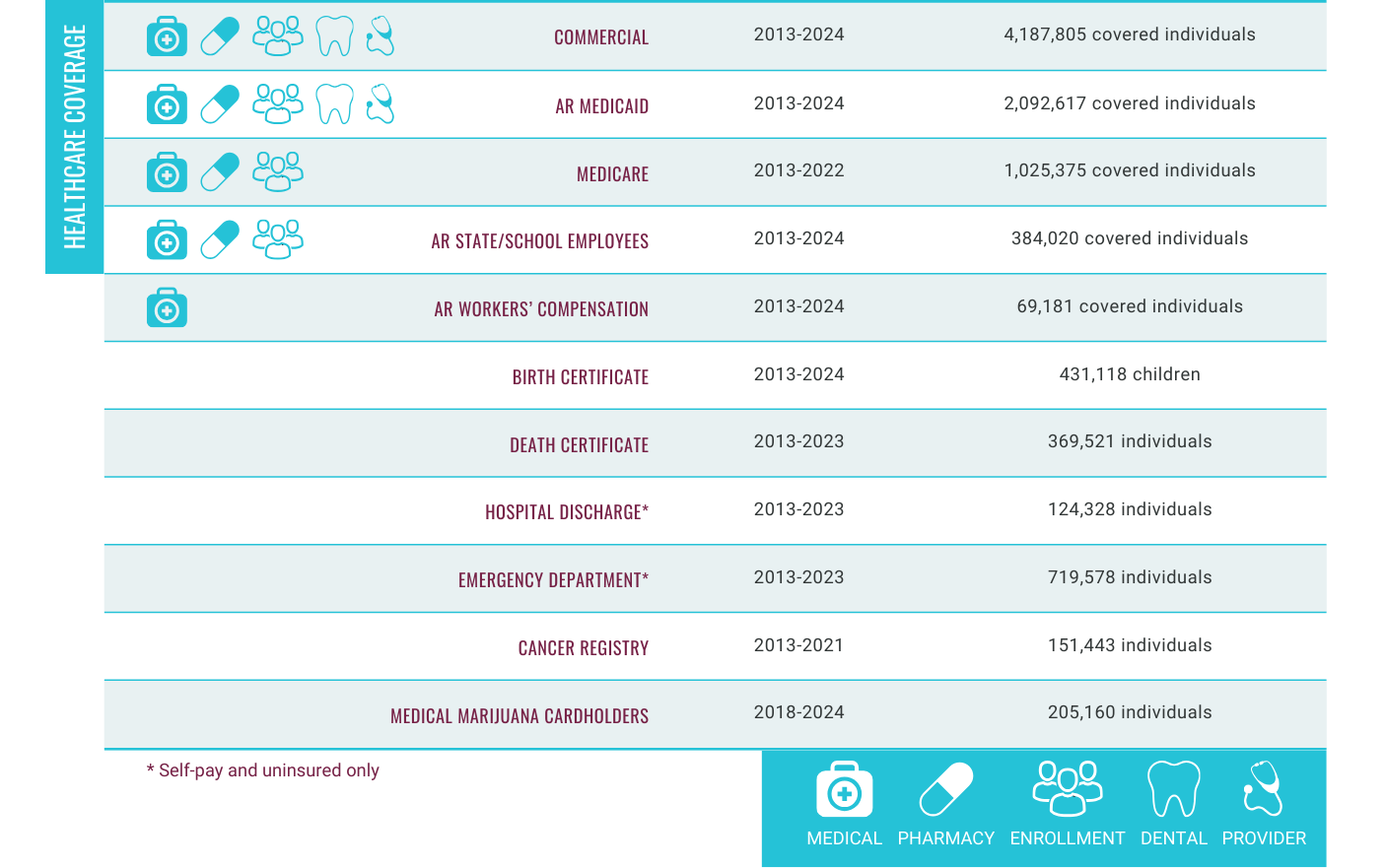Arkansas Healthcare Transparency Initiative
The Arkansas Healthcare Transparency Initiative (HTI) supports consumers, researchers, and policymakers by providing an independent source of administrative healthcare data.
Healthcare Data Assets
Governance
Research
Access to Data
Data User Resources
Data Submitter Portal
The Arkansas Healthcare Transparency Initiative Act (Act 1233 of 2015) recognizes the need for greater transparency of healthcare information as well as the data infrastructure necessary to support research, quality improvement activities, and program development and evaluation. The purpose of the initiative is to create and maintain a unified source of healthcare data for the state that allows consumers, researchers, and policymakers to:
- Gather information about healthcare utilization, quality, and pricing
- Monitor the success and efficiency of efforts to improve health care and population health
- Obtain and integrate information for research
- Study the evolving landscape of the state’s health and healthcare system
- Support quality improvement initiatives and efforts to compare provider performance with that of other provider peers
Data within the HTI is maintained and administered by ACHI with oversight from the Arkansas Insurance Department (AID).
HEALTHCARE DATA ASSETS
The HTI’s data infrastructure integrates claims-based data from commercial insurers and public payers with non-claims-based health data from partnering agencies. Data are linked using an encrypted ID to ensure that no personal identifiers are included and to enable multidimensional analysis across datasets for a more comprehensive perspective on the state’s healthcare landscape.
Arkansas All-Payer Claims Database
Fundamental to the initiative is the Arkansas All-Payer Claims Database (APCD) – a large-scale database that enables the systematic collection of healthcare data from a variety of public and private sources. The Arkansas APCD is a dynamic tool that contains claims-based data including medical, pharmacy, and dental claims as well as enrollment data and provider files.
Supplemental Health Data
Acts 948 and 979, both of 2017, mandate that partnering agencies submit non-claims-based healthcare data to the HTI for use in conjunction with claims-based data from the Arkansas APCD. These supplemental data include vital records, disease registry information, hospital discharges and emergency department utilization for uninsured Arkansans and those who self-pay, medical marijuana data, and other information.
Entities that submit to the HTI include issuers of health or dental insurance plans, Medicaid, Medicare (with agreement from the federal government), the state and public school employee plan, state-funded colleges and universities, the Arkansas State Police, the Arkansas Workers’ Compensation Commission, pharmacy benefit managers (PBM), third-party administrators (TPAs), managed care organizations, Provider-led Arkansas Shared Savings Entities (PASSE), and the Arkansas Department of Health. The following table shows the data elements available and the date range covered for each:

The HTI employs appropriate methods for collecting, maintaining, and reporting healthcare information, including data use and disclosure requirements, a formal governance structure, and privacy and security safeguards. All data collected are treated as confidential, are exempt from the Freedom of Information Act, and are not subject to subpoena except under AID authority. Direct personal identifiers (e.g., name, address, Social Security number, date of birth) are not publicly disclosed, but researchers can connect records across providers, coverage types, and other connected files through an encrypted ID system developed by ACHI.
ACHI ensures data within the HTI are protected through encryption to prevent access by unauthorized individuals. Physical safeguards, such as housing the data in a high-security space with no public access, provide additional protection.
Data Enhancements
As part of an ongoing improvement and sustainability plan, ACHI continually works to develop HTI enhancements to make data more accessible. Together, these enhancements expand the utility of HTI data, supporting research and policy analysis to improve healthcare outcomes statewide.
One enhancement effort is the development of a multi-payer dashboard of healthcare spending data to help policy leaders and the public better understand the basic drivers of and variations in healthcare costs in Arkansas. By aggregating data by payer type, county, and service category, the Arkansas Healthcare Expenditures Dashboard highlights key differences across the state and supports evidence-based decision making.
Additional enhancements include:
HTI Mother/Infant Crosswalk
A supplementary, reusable dataset that enables data users to link mother and infant data within HTI claims-based and non-claims-based data. This enhancement enables researchers to more accurately explore the impact of maternal health on infant well-being as well as other related subjects.
HTI Diabetes Analytic Data Mart
A reusable, analyzable dataset containing multiple years of enrollment, medical, pharmacy, and dental service information for individuals diagnosed with types 1 and 2 diabetes (with and without complications). This supplementary data asset enables analysts and researchers to explore various aspects of diabetes care, including the geographic distribution of members, the volume and rates of diabetes services utilized, associated costs, and the impact of sustained healthcare coverage on condition management.
Member Enrollment Selection Table (MEST)
A table that simplifies the process of identifying study populations by offering data users the ability to easily segment and identify study populations by member enrollment and coverage activity. It also introduces the ability to categorize populations based on payer type, facilitating more nuanced and targeted research efforts.
governance
The HTI is under the authority of the AID, with consultation from a 13-member board. The HTI Board advises AID, focusing primarily on the oversight of data requests and data outputs. To support its functions, two specialized subcommittees have been established:
- Data Oversight Committee: Reviews data requests and makes recommendations to the HTI Board, ensuring that data usage aligns with the initiative’s objectives and privacy standards.
- Scientific Advisory Committee: Provides a critical peer review function for academic research proposals, upholding the scientific integrity of projects utilizing HTI data.
ACHI serves as the initiative’s statutorily designated administrator and submits biennial reports on HTI operations to the Arkansas General Assembly.
HTI Board Meeting Schedule
HTI Board Meeting Minutes
Search meeting minutes by date:
You can find board meeting minutes for July 2020 and before here
RESEARCH
There is a growing demand for healthcare information transparency in Arkansas to promote high-value care and advance research.
Since the initiative’s inception, ACHI has fulfilled more than 150 HTI data requests for healthcare-related research conducted by state agencies, major universities across the United States, and private organizations.
Research conducted using initiative data must demonstrate a benefit to Arkansas and past projects have included studies of hospital price transparency, disparities in healthcare access, healthcare utilization among low-income populations, and the effectiveness of home-visiting programs on maternal and child health among other topics.

In addition to administering the HTI, ACHI’s team also conducts rigorous, evidence-based research that uniquely contributes to the local and national understanding of individual health and our healthcare system performance. From statewide obesity research to evaluation of coverage in the state’s Medicaid expansion program, ACHI’s research spotlights Arkansas’s opportunities and challenges as part of ongoing efforts to improve the health of all Arkansans.
HTI-Related Research and Publications
ACCESS to data
The Arkansas HTI data assets, including the Arkansas APCD and Arkansas non-claims-based health data, are available to data users. Data user requests must go through a review and approval process to ensure the proposed data usage aligns with HTI guidelines.
The Arkansas HTI Data Oversight Committee reviews and makes recommendations to the board and AID regarding data requests. The Scientific Advisory Committee serves in a peer review role for academic researchers and provides advice regarding data requests for academic proposals. The HTI Board and committees will advise AID on all data use and release matters. The Arkansas HTI technical team will guide the data requester through the process after submission.








